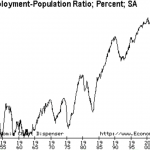 One benefit of the global economic crisis is the proliferation of first-rate economic writers like Brad DeLong. Here is number one on his Ten Economics Pieces Worth Reading.
One benefit of the global economic crisis is the proliferation of first-rate economic writers like Brad DeLong. Here is number one on his Ten Economics Pieces Worth Reading.
1. Olivier Blanchard: The State of Macro Is Not Good:
[I]t’s time for a reassessment of what we know…. It was tempting for macroeconomists and policymakers to take much of the credit for the steady decrease in cyclical fluctuations from the early 1980s on and to conclude that we knew how to conduct macroeconomic policy. We did not resist temptation. The crisis naturally forces us to question our earlier conclusions…. [E]conomists and policymakers alike were lulled into a false sense of security by the apparent success of economic policy ahead of the crisis—a period known as the ‘Great Moderation.’… The crisis has taught us a lot and we want to proactively draw lessons from the ‘Great Recession.’…
Keeping output close to potential and inflation low and stable should be the two targets of policy. And controlling inflation remains the primary responsibility of the central bank. But the crisis forces us to think about how these targets can be achieved… [and] the crisis has made clear… that policymakers have to watch many other variables, including the composition of output, the behavior of asset prices, and the leverage of the different participants in the economy…. Interest rates are a poor tool to deal with excess leverage, excessive risk taking, or apparent deviations of asset prices from fundamentals. We need a combination of monetary and regulatory tools… traditional regulatory and prudential frameworks need to acquire a macroeconomic dimension….
The crisis has shown that interest rates can actually hit the zero level, and when this happens it is a severe constraint on monetary policy that ties your hands during times of trouble. As a matter of logic, higher average inflation and thus higher average nominal interest rates before the crisis would have given more room for monetary policy to be eased during the crisis and would have resulted in less deterioration of fiscal positions. What we need to think about now if whether this could justify setting a higher inflation target in the future…. [L]arge shocks to the system can and do happen…. Maybe policymakers should therefore aim for a higher target inflation rate in normal times, in order to increase the room for monetary policy to react to such shocks. To be concrete, are the net costs of inflation much higher at, say, 4 percent than at 2 percent, the current target range? Is it more difficult to anchor expectations at 4 percent than at 2 percent?…
The crisis has returned fiscal policy to center stage as a macroeconomic tool, for two main reasons: first, to the extent that monetary policy, including credit and quantitative easing, had largely reached its limits, policymakers had little choice but to rely on fiscal policy. Second, from its early stages, the recession was expected to be long lasting, so that it was clear that fiscal stimulus would have ample time to yield a beneficial impact despite implementation lags. It has also shown the importance of having “fiscal space,” again the room to maneuver during times of trouble. Some advanced economies that entered the crisis with high levels of debt and large unfunded liabilities have had limited ability to use fiscal policy, and are now facing difficult adjustments…. [W]e should revisit target debt to GDP ratios. Maybe we should aim for much lower ratios than before the crisis. This is a long way off, given where we start, but this is another issue we must revisit…
ATTENTION READERS
We See The World From All Sides and Want YOU To Be Fully InformedIn fact, intentional disinformation is a disgraceful scourge in media today. So to assuage any possible errant incorrect information posted herein, we strongly encourage you to seek corroboration from other non-VT sources before forming an educated opinion.
About VT - Policies & Disclosures - Comment Policy



